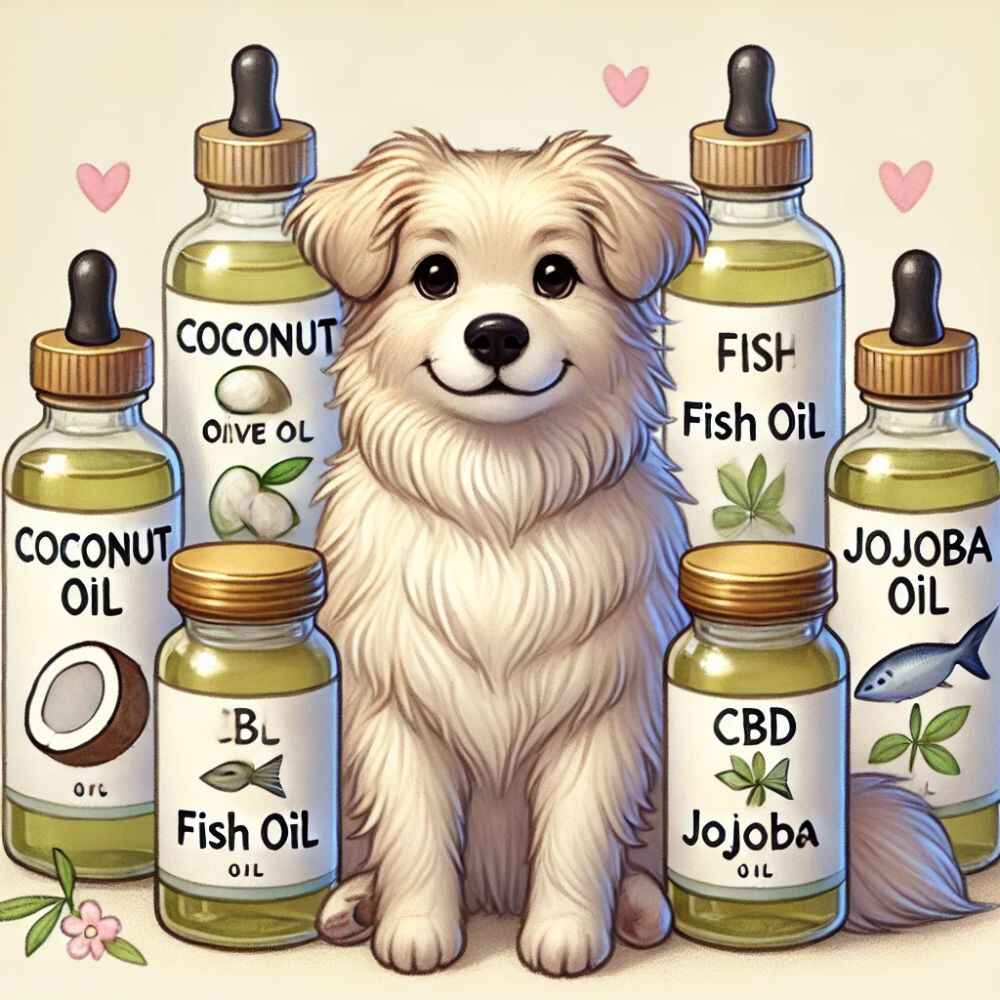When your dog starts scratching constantly, it can be concerning. If you’re like most dog owners, you want to find a natural and effective solution to soothe your pup’s itchy skin.
Luckily, using oils can be a game-changer! But, which oils are good for your dog’s skin? Let’s find out how the right oils can help keep your dog comfortable and itch-free.
Understanding Why Dogs Get Itchy Skin
We’ve all seen it—a dog constantly scratching, licking, or biting their fur. But why does it happen? Dogs can get itchy skin for a variety of reasons.
It could be allergies (either to food or environmental factors like pollen), dry skin, fleas, or even something as simple as shampoo residue.
Figuring out the cause can be tricky, but in many cases, applying oil directly to the skin can help calm the irritation and stop the scratching.
When it’s dry, it cracks and becomes irritated, and that’s when your furry friend starts scratching like there’s no tomorrow. The right oil acts like a soothing balm, hydrating the skin and providing relief.

The Benefits of Using Oils for Your Dog’s Skin
So, why use oils for itchy skin? Well, oils are natural, gentle, and often packed with nutrients that your dog’s skin craves. They’re like a superfood for the skin!
Oils can help moisturize dry patches, reduce inflammation, and even support overall skin health. Plus, most of these oils are easily accessible, affordable, and simple to use.
Oils can also provide a protective barrier on the skin, keeping out allergens and helping wounds or hotspots heal faster. And let’s not forget—they can make your dog’s coat look shinier and healthier too. It’s a win-win!
Best Oils for Dogs with Itchy Skin
There’s a variety of oils you can choose from, but not all oils are created equal. Some oils are better suited for dogs, while others may cause more harm than good.
Below are some of the best oils that can help soothe your dog’s itchy skin.
1. Coconut Oil
Coconut oil is one of the most popular choices for soothing itchy skin in dogs—and for a good reason! It’s packed with fatty acids like lauric acid, which have anti-inflammatory, antibacterial, and antifungal properties.
This makes it perfect for calming irritated skin, fighting infections, and keeping your dog’s coat looking smooth and shiny.
Applying coconut oil is easy. You can rub a small amount directly onto the affected areas, or even add a teaspoon to their food.
Just be careful not to go overboard, as too much can cause greasy fur or digestive upset.
According to Dr. Katie Gryzb, a veterinarian based in Brooklyn, coconut oil is one of the safest and most effective oils for treating dogs with dry and itchy skin. Dr. Gryzb explains, “Coconut oil can help reduce yeast and fungal infections that can occur with allergies, and it can also be applied topically to soothe dry skin.”
2. Olive Oil
Olive oil isn’t just for cooking—it’s a fantastic moisturizer for dogs, too. Rich in antioxidants and vitamin E, olive oil helps to nourish the skin and reduce inflammation.
If your dog’s itching is due to dry skin, olive oil can restore much-needed moisture.
Simply massage a little olive oil into your dog’s skin or add a few drops to their food. But remember, a little goes a long way, especially when applying it topically.

3. Fish Oil
Fish oil is a powerhouse when it comes to boosting your dog’s skin and coat health. It’s full of omega-3 fatty acids, which are known to reduce inflammation, promote healing, and improve skin hydration.
If your dog suffers from chronic allergies or dermatitis, fish oil is definitely worth considering.
You can find fish oil in supplement form, making it easy to add to your dog’s meals. Many pet owners notice significant improvements in their dog’s coat and reduced itching after consistent use.
Research from the Journal of Veterinary Internal Medicine shows that omega-3 fatty acids, found in fish oil, significantly improve skin hydration and reduce inflammation in dogs with allergic skin conditions.
4. CBD Oil
CBD oil has been making waves lately, and it’s not just for humans. It can also be a great option for dogs with itchy skin, especially if inflammation or anxiety is causing the scratching.
CBD oil has calming properties that reduce inflammation and promote overall skin health.
Before giving your dog CBD oil, make sure to consult your vet, as dosages can vary depending on the size and condition of your dog.
5. Jojoba Oil
Jojoba oil is another excellent choice for dry and itchy skin. It closely mimics the natural oils found in your dog’s skin, making it a perfect moisturizer.
Jojoba oil is also non-toxic and absorbs quickly, so you won’t have to worry about a greasy mess.
Apply jojoba oil sparingly to the itchy areas, and watch your dog’s skin soak up the benefits.
How to Apply Oils to Your Dog’s Skin
You may be wondering: How exactly do I use oils on my dog? It’s pretty straightforward! When applying oil topically, you can rub a small amount into your dog’s skin using your hands.
Focus on the affected areas, like where the itching seems the worst. Massage gently, just like you’d rub lotion on your own skin. Dogs generally enjoy this, so you might even turn it into a relaxing bonding moment for the two of you.
For oils that are safe to ingest (like fish oil or coconut oil), you can also mix a small amount into your dog’s food. This way, your dog benefits from the oil inside and out.
But remember, start with small doses—just like humans, dogs can have sensitive stomachs, and too much oil too quickly can cause digestive issues like diarrhea.

Safety Tips for Using Oils on Dogs
While oils can be super helpful, you want to be cautious and make sure you’re using them safely. Here are a few key tips:
1. Do a Patch Test First
Just like people, dogs can have allergic reactions to certain substances. Before applying oil to a large area, try a small patch test on your dog’s skin.
Wait 24 hours and check for any redness or irritation. If everything looks fine, you’re good to go!
2. Use High-Quality, Natural Oils
Make sure you’re using high-quality oils that are free of chemicals and additives. Look for organic or cold-pressed options, especially when it comes to oils like coconut or olive oil.
Cheap oils can have impurities that might irritate your dog’s skin even more.
3. Consult Your Vet
Before introducing any new supplement or topical treatment, it’s always smart to talk to your vet. They can help you figure out the right type of oil and dosage, especially if your dog has underlying health conditions.
When to See a Vet
Sometimes, itchy skin can be more than just a minor irritation. If your dog’s scratching is constant, severe, or accompanied by other symptoms like hair loss, open sores, or signs of infection, it’s time to see the vet.
Oils can help with mild issues, but serious skin conditions often require medication or a more in-depth treatment plan.
Also, if your dog’s itching is due to something like fleas, ticks, or a food allergy, oil alone won’t solve the problem. A vet can help you identify the root cause and recommend the best course of action.
Final Thoughts
Itchy skin can be a major nuisance for your dog, but the right oils can offer relief and keep your furry friend comfortable.
Whether it’s coconut oil, olive oil, or fish oil, these natural remedies are an easy, affordable way to soothe your dog’s skin and support their overall health.
Just remember to use oils in moderation, consult your vet, and keep an eye on your dog’s response.
If you notice improvement, that’s great! But if the itching persists or worsens, don’t hesitate to seek professional advice. Your dog’s well-being is worth it.
FAQs
1. How often should I apply oil to my dog’s itchy skin?
It depends on the oil and the severity of the itching. For mild cases, applying oil once a day or every other day should suffice. Always start with small amounts and observe how your dog’s skin responds.
2. Can I give my dog coconut oil orally for itchy skin?
Yes, you can! Many dog owners add coconut oil to their dog’s food to promote healthy skin from the inside out. Just be sure to start with a small dose, around 1/4 teaspoon for small dogs and up to 1 teaspoon for larger dogs.
3. Is olive oil safe for all dogs?
Olive oil is generally safe for dogs, but like any new addition to their diet or skincare routine, it’s best to introduce it gradually. Some dogs may have sensitive skin or digestive systems, so watch for any adverse reactions.
4. Can I use essential oils for my dog’s itchy skin?
Some essential oils can be harmful to dogs, so it’s important to be cautious. Oils like tea tree and peppermint can be toxic. Always dilute essential oils heavily and consult your vet before using them on your dog.
5. What if my dog licks the oil off their skin?
It’s natural for dogs to lick themselves, and small amounts of oils like coconut or olive oil are safe if ingested. However, excessive licking might mean you’ve applied too much oil, so try using less next time.

Pingback: Best Pet Insurance for Brachycephalic Dogs and Cats
Pingback: Why Is My Dog's Poop Orange After Eating Chicken and Rice?
Pingback: Is Aquaphor Safe for Dogs? Everything You Need to Know
Pingback: White Line on Dog’s Nose Explained: All You Need to Know